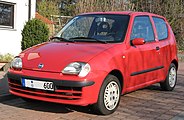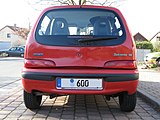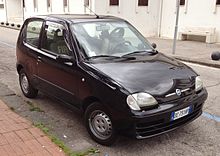Fiat Seicento
| Fiat | |
|---|---|
|
Fiat Seicento (1998-2000)
|
|
| Seicento (type 187) | |
| Production period: | 1998-2011 |
| Class : | Microcar |
| Body versions : | Station wagon |
| Engines: |
Otto engines : 0.9–1.2 liters (29–51 kW), electric motor : 30 kW |
| Length: | 3337 mm |
| Width: | 1508 mm |
| Height: | 1445 mm |
| Wheelbase : | 2200 mm |
| Empty weight : | 790-810 kg |
| Previous model | Fiat Cinquecento |
| successor | Fiat 500 (2007) |
| Stars in the Euro NCAP - Crash Test (2000) |
|
The Fiat Seicento (Seicento = Italian for 600) is a small car from Fiat that was manufactured between the beginning of 1998 and the end of 2009. It is the successor to the Fiat Cinquecento .
The name is reminiscent of the Fiat 600 from the 1950s. On the 50th anniversary of the historic Fiat 600, the Seicento was renamed Fiat 600 and sold under this name from spring 2005 to the end of 2009.
Sales in Germany were discontinued at the end of 2007.
history
In March 1998 the Seicento made its debut in the subcompact class.
Technically, it is based on the Cinquecento and is almost the same except for the body. It is 3.34 meters long, has front-wheel drive and a transverse engine. The front wheels are individually suspended on MacPherson struts and wishbones , the rear on parallel swing arms . The Seicento has a slightly more modern, rounded, streamlined shape in line with the development of contemporary tastes. Three engines were available for the Seicento: 899 cm³ with 29 kW (40 PS), 1108 cm³ with 40 kW (55 PS) and an electric motor with a nominal output of 15 kW (20 PS).
The trunk has a capacity of 170 l according to VDA standards.
Facelift
In autumn 2000 Fiat upgraded the Seicento externally and technically.
In mid-October 2000 Fiat streamlined the model range on the German market and revised the engine. From then on, the 1108 was equipped with multi-point injection - one electronically controlled injection nozzle per cylinder - which made it possible to classify it in a lower emission class. In addition, extended standard equipment including an anti-lock braking system and design modifications were offered that emphasize its youthful, attractive line.
From the outside, the 2001 model year Seicento differed from the vehicles offered up to then by more striking bumpers with louvred air grilles and optional, integrated fog lights, indicators with white covers, new wheel covers, side protection strips as well as 165/55 R13 wide tires and the new Fiat logo.
Models
Seicento S / Young
The Seicento S / Young was offered with the small engine 1170 A1.046 (899 cm³), whereby the technical data correspond to the Citymatic. In 1999 it already had airbags, seat belt tensioners and power steering, but no painted bumpers and mirrors. The interior was kept simple: there were no electric windows, for example. The version with the small engine has not been manufactured since the revision in autumn 2000.
Seicento Sole / Sound
The external characteristic of the Seicento "Sole", which is based on the Fiat Seicento "Sound" (1.1-liter four-cylinder engine with 40 kW / 55 PS), is the "Sole" lettering on the sides. In addition to the extensive equipment of the "Sound" version, including electric windows, sports seats, RDS radio with CD player and sound system with four loudspeakers, bumpers painted in body color, sporty front apron including fog lights as well as heat-insulating glazing and immobilizer, it was equipped with an electric Webasto folding roof equipped.
Seicento Citymatic
Chassis number: 187AXA1A
In Citymatic an electronically controlled automatic was clutch used. Shifting takes place with a normal shift lever after releasing the gas. The engagement depends on the engine speed, the accelerator pedal position, the driving speed and the gear engaged. The control unit of the clutch is, however, susceptible to failure in terms of vibrations. If a defect occurs, the embedded electronics cannot be repaired. An exchange is required.
This version was only available in conjunction with the smallest engine (899 cm³). The equipment included, for example, painted bumpers and mirrors as well as electric windows. Production was stopped in autumn 2000.
Seicento SX / Suite / Hobby
Chassis number:
- Pre-facelift: 187AXB1A
- Facelift: 187AXC1A
The designations SX / Suite / Hobby denote the better equipped versions of the Seicento, but were only available with the engine 176 B2.000 (1108 cm³) built up to October 2000. In addition to airbags and seat belt tensioners, the equipment also includes electric windows, electric power steering , painted bumpers and exterior mirrors as well as a higher-quality interior. The anti-lock braking system (ABS) was not standard until the facelift in autumn 2000. The equipment variant Suite also had air conditioning.
Seicento Sporting
Chassis number:
- Pre-facelift: 187AXB1A
- Facelift: 187AXC1A
The Sporting variant describes the version that has been “pepped up” both externally and technically. The Sporting not only had wider tires of size 165/55 R13 as standard, but also a modified front, rear aprons and wheel arches. This changes the external dimensions slightly. In addition, the transmission has a shorter overall ratio because fifth gear is not designed as an energy-saving gear.
Seicento Sporting - Abarth
The Sporting Abarth model was based on the Sporting model . In addition to the Sporting, the Sporting Abarth had 14-inch aluminum wheels and a widened front track, a rear spoiler lip, side skirts in body color, an accelerator pedal with a perforated sheet metal pattern, a sports steering wheel, from 2000 power steering, ABS and a gear knob with red stitching and headrests with Abarth -Logos.
Seicento Sporting - Schumacher Edition
With the Seicento Michael Schumacher World-Champion Edition, Fiat offered a special version of 1000 vehicles that combined the name of the then three-time Formula 1 world champion with a number of special equipment details. The model was based on the Seicento Sporting (1.1 liter engine with 40 kW / 55 PS) and also offered light alloy wheels with the Fiat logo including wide tires, a spoiler lip at the rear, special pedals with aluminum footrests, leather steering wheel and leather gear knob as well as handbrake lever and gear lever cover in aluminum. Michael Schumacher's signature was on the tailgate, door sills and side skirts. The number is on both side bars and on a badge (the 475th car of the edition, for example, has the number "475/1000").
Seicento Turbo
For the Seicento before October 2000, the tuning companies Novitec, G-Tech, Hörmann-Motorsport and Merkur offered turbo conversion kits (74 kW / 101 PS) with road approval that took the 800 kg vehicle from 0 Accelerate to 100 km / h. With the 6-speed gearbox offered for this, the vehicle can reach a top speed of 204 km / h.
The no longer available conversion from G-Tech is specified with an output of 84 kW (114 PS). The consumption was 8.8 l Super Plus. However, G-Tech also used a 1.2-liter engine .
Van
Chassis number:
- Pre-facelift: 187CXA1A
- Facelift: 187CXC1A
The Seicento Van was technically and externally similar to the limousine, but had no rear seats, but a loading area. It is designed as a small courier vehicle. The loading volume is 440 l up to the lower edge of the windows and 810 l up to the roof. This corresponds to the sedan with the rear seat bench folded down (according to VDA). The van is not available in Austria.
50th Anniversary Edition
The Seicento was also marketed as the 50th Anniversary Edition towards the end of production . This was painted in pastel tones (based on the late 1950s) and the lettering on the rear was given for the first time in digits as 600 .
In Austria, the model had a few extras such as electric power steering, radio with CD player, airbag for driver and front passenger, exterior mirrors adjustable from the inside, heat protection glazing, power windows, exterior mirrors and bumpers in body color, central locking, smoking kit, ABS, side protection strips, etc. With a list price of 7,699 euros, it was the cheapest new vehicle on the Austrian car market.
This version was also launched in Germany and was offered in three pastel shades, including Charleston ivory. However, the German version only has a radio preparation, otherwise the model is the same as the Austrian and was sold in Germany at a list price of 7,999 euros as one of the last Seicento models.
Technical specifications
| 899 i. e. | 1100 i. e. | 1200 i. e. | Elettra | ||
|---|---|---|---|---|---|
| Construction period | 01 / 1998-09 / 2000 | 10 / 2000-12 / 2009 | 06/2007–12/2009 | 01 / 1998-02 / 2005 | |
| Engine characteristics | |||||
| Engine type | Otto engine, four cylinders in line | Asynchronous motor | |||
| Number of valves per cylinder | 2 | - | |||
| Valve control | side camshaft , chain | overhead camshaft , toothed belt | - | ||
| Mixture preparation | Manifold injection | - | |||
| Engine charging | - | ||||
| cooling | Water cooling | ||||
| Engine manufacturer | Fiat | Siemens | |||
| Engine identification | 1170A1046 | 176B2000 | 187A1000 | 169A4000 | 1-LH5118 |
| Bore × stroke | 65.0 x 67.7 mm | 70.0 x 72.0 mm | 70.8 x 78.9 mm | - | |
| Displacement | 899 cc | 1108 cc | 1242 cc | - | |
| Compression ratio | 8.8: 1 | 9.6: 1 | 11.1: 1 | - | |
| Max. power | 29 kW (39 hp) at 5500 rpm |
40 kW (54 PS) at 5500 rpm |
40 kW (54 PS) at 5000 rpm |
51 kW (69 PS) at 5500 rpm |
15 kW (P rated ) 80 kW (P max ) |
| Max. Torque | 65 Nm at 3000 rpm |
86 Nm at 3250 rpm |
88 Nm at 2750 rpm |
102 Nm at 3000 rpm |
65 Nm (M nominal ) 123 Nm (M max ) |
| Power transmission | |||||
| drive | Front wheel drive | Rear wheel drive | |||
| transmission | 5-speed manual transmission | Single transmission | |||
| Readings | |||||
| Top speed | 140 km / h | 150 km / h | 160 km / h | 100 km / h | |
| Acceleration, 0-100 km / h | 18.0 s | 13.8-14.8 s | 14.2-14.8 s | 12.9 s | k. A. |
| Fuel consumption over 100 km (combined) | 6.1 l p | 5.8-6.4 l S | 6.0-6.5 S. | 5.6 l S | - |
| CO 2 emissions (combined) | 145 g / km | 137-151 g / km | 143-155 g / km | k. A. | - |
| Emission standard | Euro2 | Euro 3/4 | Euro4 | - | |
| Remarks | |||||
| not for E10 fuel suitable | for E10 fuel suitable | 18 lead glass fleece batteries of 12 V and 60 Ah each | |||
literature
- Fiat Seicento owner's manual . Fiat Auto SpA, April 1999.
- Fiat Seicento owner's manual . Fiat Auto SpA, May 2003.
- Fiat 600 owner's manual . Fiat Auto SpA, December 2007 (English)
- Automobile revue . Catalog 2000 and 2001.
Web links
Individual evidence
- ↑ The Fiat Seicento in the Euro NCAP crash test, 2000 (accessed on July 6, 2014, English)
- ↑ Bosch product finder, windshield wipers 1999/2000 (Danish and Norwegian)
- ↑ Specs 2008 Fiat 600 1.2 (accessed on July 6, 2014, English)
- ↑ http://www.hec-drives.com/Specs%20Siemens%20small%20EV%20motors.pdf (accessed on September 25, 2016, English)
- ↑ E10 ( Memento of the original from February 27, 2014 in the Internet Archive ) Info: The archive link was inserted automatically and has not yet been checked. Please check the original and archive link according to the instructions and then remove this notice. on Fiat.de (accessed on July 6, 2014)
- ↑ E10 compatibility ( Memento of the original from May 11, 2011 in the Internet Archive ) Info: The archive link was inserted automatically and has not yet been checked. Please check the original and archive link according to the instructions and then remove this notice. at DAT, accessed on November 9, 2014



